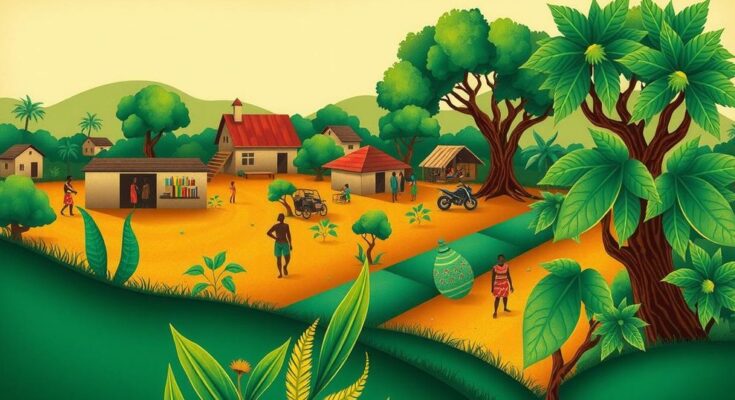A recent conference highlighted findings from the Afrobarometer Round 10 survey, which examined Liberia’s socio-economic landscape. Key takeaways include public division on national progress, strong support for democratic governance, awareness of climate change, and concerns about migration. The data call for urgent policy responses to enhance living conditions and promote inclusivity in society.
On March 13, 2025, a pivotal conference organized by the Center for Democratic Governance was held at the Corina Hotel in Monrovia. This event gathered various partners and donors to discuss the findings of the Afrobarometer Round 10 survey. The survey explored critical areas such as climate change, economic conditions, migration, and international relations from the viewpoint of Liberians concerning their future.
Elkanah Y. Taylor, the Program Coordinator at the Center, provided an in-depth analysis of the survey’s methodology and results. Notably, the survey revealed a stark divide among citizens; 50% believe Liberia is progressing positively, while the other half disagree. Economic perceptions were similarly split, with 48% describing the conditions as poor and 45% holding a favorable view. Additionally, living conditions reflected this duality, as 46% expressed dissatisfaction while an equal number reported contentment. However, 61% exhibited optimism regarding future economic improvements, with rising approval ratings for government performance.
Taylor underscored the strong rejection of authoritarian governance in Liberia, noting significant public support for democratic principles. The survey revealed that 79% of local government councilors and 88% of parliamentary members are viewed as disengaged from the populace. A concerning 66% of respondents indicated that officials committing crimes seldom face accountability, while 58% expressed fears regarding political interference in judicial matters.
Regarding foreign economic engagement, the survey showed that 68% of participants believe China significantly impacts Liberia’s economy. While a favorable view of American influence was noted by 86%, perceptions of China’s and India’s roles were positive at 79% and 58%, respectively. Conversely, only 39% regarded Russian influence positively. Additionally, over three-quarters acknowledged the constructive roles of ECOWAS and the African Union in Liberia’s political environment, emphasizing the importance of maintaining diplomatic neutrality amid the Russia-Ukraine conflict.
The survey also examined climate change awareness; 68% of Liberians confirmed their understanding of the issue, with 71% believing that climate change worsens conditions in Liberia. A strong consensus emerged, as 82% insisted that both the government and affluent nations must prioritize proactive measures against climate change, with 81% advocating for investment in renewable energy and other infrastructural initiatives.
In the realm of women’s rights and health autonomy, the survey found that 78% of respondents support allowing women to choose when to marry and have children. Furthermore, 77% favored ongoing education for pregnant girls, while 61% deemed abortion justifiable in specific scenarios, including health risks to the mother and pregnancies resulting from rape.
Migration emerged as a prominent concern, with 77% of respondents considering leaving Liberia—particularly among the educated and employed. The quest for better economic opportunities was identified as the main motivation for potential emigration, with North America being the preferred destination for 52% of these individuals.
The results of the survey highlight a complex socio-economic landscape in Liberia, underscoring the urgent need for responsive policymaking that addresses the citizens’ economic, social, and environmental concerns, while striving for a more inclusive and democratic society.
The Afrobarometer Round 10 survey reveals critical insights into Liberia’s socio-economic conditions, showcasing a divided public sentiment regarding progress and economic status. The emphasis on democratic engagement, foreign influences, climate change awareness, women’s rights, and migration challenges underscores the need for urgent, responsive policies. Addressing these multifaceted concerns is essential for the nation’s development and inclusivity.
Original Source: frontpageafricaonline.com




